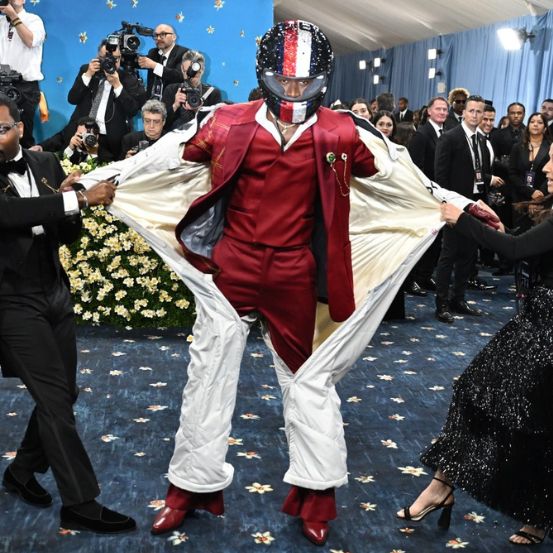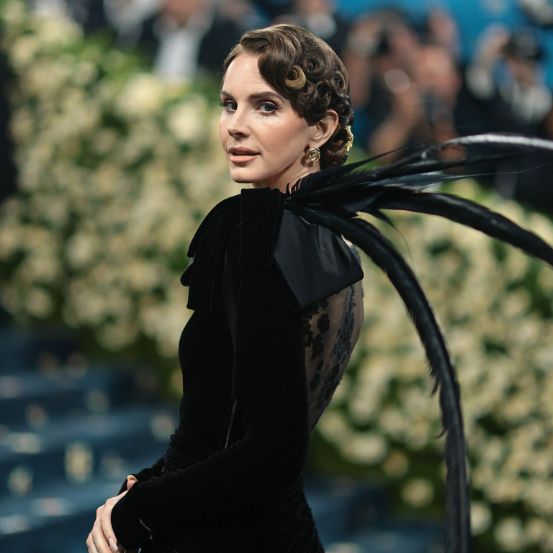His work is spread over streets, alleys and avenues in several cities, all over the world; it is open to the public, free from the constraints, and the limitations, of galleries and museums. That's exactly what moves JR, the French artist and activist who hides himself behind a hat and sunglasses - people, causes, life.
His work is spread over streets, alleys and avenues in several cities, all over the world; it is open to the public, free from the constraints, and the limitations, of galleries and museums. That's exactly what moves JR, the French artist and activist who hides himself behind a hat and sunglasses - people, causes, life.
On the morning we speak to JR, a Friday that doesn’t seem to decide between gray clouds and blue cotton skies, Portugal and France are already living under the cover of their respective declarations of state of emergency. On his Instagram page, JR, the French artist who, amongst other distinctions, was awarded a TED Prize (in 2011, which allowed him to create one of his most dynamic projects, the Inside Out Project) had just shared with his 1.5 million followers the following challenge: “A few years ago, the buddhist monk Mathieu Ricard showed me the book Motionless Journey with photos he took from his window while he was confined in Nepal during a yearlong retreat. It was amazing to see how many different perspectives you can have from a single small window to the outside world… […] Today, we are confined at home and we must make it a valuable experience. I have asked the students of the Kourtrajmé Photo School in Paris to do a photo from their confined place every day and to publish it with the hashtag #frommywindowframe. Of course, everyone can participate… Stay safe, stay home.” The plea is is a reflection of JR's work and path. Nobody knows exactly who he is, where he comes from, or how old he is, and this aura of mystery piques curiosity about an artist who, in the biography available on his official website, guarantees to have “the largest art gallery in the world.” The streets. The ones that never fail him. He started there, in 2004. By chance. He will guarantee, later on the interview, that he didn't even knew it was possible to be an artist. But fate played this trick on him, and no one regrets it. Neither he nor us.
Why do you think this is happening? Do you have any reasonable explanation? Well, we’ve always known that a pandemic like this could happen. It has been said a few times. It happened a hundred years ago. It was just a possibility, but we never wanted to believe it. We made movies about it, we imagined this scenario many times, there’s many TV shows about pandemia…And here we are.
It seems we are living in a parallel reality. It’s very strange. We are going to have to come back stronger. It’s in times like these that we define how we are as humans and as people, and how we support each other. We are living this in another time than hundred years ago, when there was no technology, so we should also take that into consideration.
Technology helps us to stay more connected. Is it why you launched the challenge to your followers? It was, first of all, because I wanted to find a way to involve my students, we are now at home but I told them ‘Well guys, we are going to have to be creative, but also let’s involve other people, so let’s do something you can do, but other people can do’. Whenever there is a chance, the classes will always be live so that other people can also enjoy.
Deep down, there are always ways to challenge ourselves. Even if we are enclosed in our houses. I strongly believe that creativity keeps you sane. And that doesn’t mean you have to be an artist. Everyone has creativity that they can use one way or the other. Now is a time for us to be even more creative, as a [form of] healing, as a way to stay sane, and also as a way to inspire others.
In your opinion, will this moment change us as humans? I think this will definitely change us somehow. It depends how long this lasts, how it impacts us, but I hope it will change us in a good way. Because for now, in moments like these, what happens is that you close borders, you close this, you close that, and it’s difficult, because you want to stop a pandemic, but how do you come back from that because we were actually trying to open borders... I think it will be a great challenge.
This issue is about freedom. This moment seems to also revolve about freedom. What does freedom mean to you? Freedom is a very relative concept. It depends on where you are born and where you are living... Some might think they are free and yet they are in jail. Of course in some cases we can all agree that a person doesn’t have freedom. But it is a very relative concept. [...] In a country like I am right now, France, some might tell you they think they feel free, some might tell you they don’t. And to the ones they think they are not free, when I travel around the world I think they don’t realise the chance they have. [...] Freedom is also a concept to constantly walk on, that is constantly evolving.
Is freedom, primarily, a political issue? It’s an endless subject, because even in countries like North Korea… For me, as a Frenchmen, I don’t feel they have freedom. And I am pretty sure if you ask most of the people here they would tell you the same. But if you go there, and ask them, they will probably say they feel free. It’s an issue that depends on where you are, on the situation, and on what you know. That’s also very important.
Much of your work deals with the borders build by society - both physical and metaphysical. Can we learn anything from this situation that we now experience, in the sense that we will think twice before closing borders to immigrants who, in the end, just want to feel safe? I am a son of immigrants. I understand that my father travelled to find a better life. And here I am in France, and I had the chance to grow up here. I even immigrated myself to New York and I lived there in the last ten years. Some people leave [their countries] because there’s no other choice and no other possibility, and some people like me, when I went to New York, I actually had the chance to choose and decide where I wanted to live. What I mean is, the notion of migrants have always existed in the history of humanity, and it will always exist. America was created with migrants and with people coming from all over the world, and what is incredibly to see is that those people who are there now, the majority of them, are saying ‘we don’t want any more strangers’ and it’s almost as if we are forgetting that they are [also] humans… That’s why I opened a restaurant in Paris with the help of Massimo Bottura [Refettorio Paris] where we serve dinner to people in situations of social vulnerability, three-course meals [of ingredients that would otherwise be wasted] in a beautiful surrounding, and they feel that we are respecting them. And by doing this I realised the power of a simple meal, the power of a beautiful presentation. As a person, you feel recognized, and I feel that this is at the core of some of my projects.
Because it is on the streets, your art gives voice to many people who, for a number of reasons, would otherwise be unable to express themselves. Why are the streets so important? I’ve always walked the streets because first I started doing graffiti but then I realised it wasn't the best way to do my projects. But the streets... People don't leave the house in the morning thinking about visiting a museum; that's why when they walk to work, and they are confronted [with art] they are completely surprised, the reaction is stronger.
What change would you like your work to effect? As an artist, you raise questions. You don’t give answers. When I start a project I don’t expect answers I just expect to discuss, to question, to have more human interaction. But what is amazing in the last 20 years is to see the impact it has in a lot of people. See the impact it has [on a certain] situation, see it change because of art. Art can change the world. Art can change the perception we have about the world.
You have a remarkable career. What is your biggest achievement so far? I never see things like that. I always feel like I was when I started: that everything can be done. I’m always challenging myself. I’m always insecure about the next project. And I often don’t even know what is the next project. I’ve been in that state of mind since the beginning.
Did you want this, growing up? Was this your dream, as a child? No! No! I didn't even know there was a job for being an artist! No one in my family was an artist. I didn't know there were schools, I didn't do any school. It wasn’t a plan, or a dream. I didn’t have references, I didn’t know Warhol or Basquiat. I heard about them way after. But because I didn't have that frame around me ‘you need to do this to be an artist, you need to do this and that’, I feel much more free. Because I didn't know there were rules for being an artist, I feel more free. I’m kind of glad it happened this way.
See all the images form this article, here.
This article was originally published in Vogue Portugal's Freedom issue, from April 2020.
Relacionados


Para além do espelho: tudo o que precisa de saber sobre procedimentos estéticos
07 May 2025



.png)

.png)
